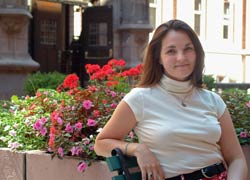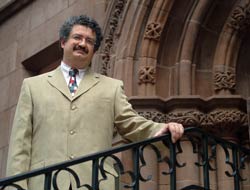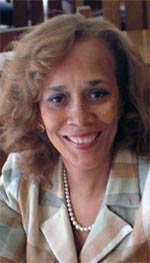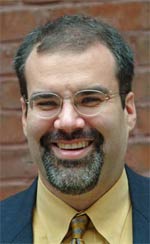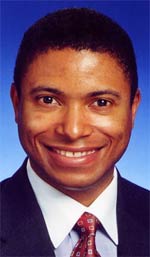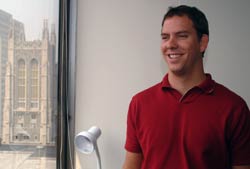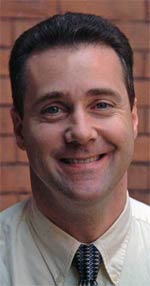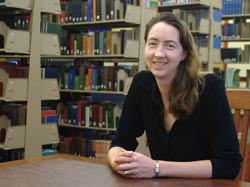New Faces
Four new tenure-track faculty members and five new staff members discuss their unique perspectives and experiences.
Alicia Broderick
Assistant Professor of Education
Curriculum & Teaching
What she'll be teaching: "I'll be involved in a new master's program in Learning Dis/Abilities, in the Department of Curriculum and Teaching, and teaching as well."
Last job: "I taught at Cal State-Long Beach in their Education Specialist Credential Program. ‘Education Specialist' is California's version of ‘special ed.'"
Why she became a teacher: "After I graduated from a traditional liberal arts program, my husband and I moved to
Book that influenced her the most: Communication Unbound: How Facilitated Communication Is Challenging Traditional Views of Autism and Ability/Disability, by Doug Biklen, of Syracuse University [published by Teachers College Press]. "Doug found that if kids who have been labeled as autistic have access to communication tools, they're capable of doing grade-level work. After reading his work, I decided I wanted to work with him, and, eventually, I did."
Most important problem in education: "Kids are being segregated into ‘special ed' classes or schools with severely impoverished curriculum, where they're not expected to learn well. Economics and race come into play, too-so that many more children of color, proportionately, are put into special ed classes. I see it as a civil rights issue. We need to have inclusive education, and that extends to the university level, where special ed is often taught by a separate faculty."
Stephanie Jones
Assistant professor of education
Curriculum & Teaching
What she'll be teaching: "Literacy courses to preservice students; literacy and cultures courses to master's and doctoral students."
Last job: "I've just graduated with my doctorate from the University of Cincinnati. I taught for four years while I was there, and for about eight years I worked with teachers across Kentucky and Ohio. Before that, I taught first and second grade."
Why she became a teacher: "My ongoing concern for social justice. Education can play a really important role."
Book that most influenced her: "The work of the educator Paolo Freire, one of the pioneers of Critical Theory, who works with marginalized people, mostly adults. Although I had been mostly working with children, his ideas made me more aware of the importance of raising marginalized students' consciousness of the value of their personal experiences, which typically are not valued by mainstream society."
Most influential teacher: "My fourth-grade teacher, Mrs. Stritt, in Goshen, Ohio. She used a lot of the methods I later learned about in my research. I thought about her often as I completed my schooling and eventually called her, 20 years later, to let her know how much of an impact she had on me as a teacher of young children."
Most important problem in education: "The disconnection between home and classroom. Working-class families and families living in poverty don't necessarily share the same cultural experiences as teachers and other school leaders. Many parents who grew up in other cultures perceive the school as an extension of the state, and for parents without documentation there is the unspoken perception that the school holds power over their homes and families. Often they see the school and the state's child protective services as closely aligned. They know one phone call from the school could cause a tremendous disruption in their lives."
Christopher Hass
Assistant Professor of Movement Sciences
Biobehavioral Sciences
What he'll be teaching: "Applied physiology, primarily to master's students. I'll be teaching about human physiology, the aging process, the neuromuscular system-various ‘subdivisions' of movement sciences."
Last job: "I was a post-doctoral Fellow at Emory University. I taught at Georgia Tech in their first-ever master's program on prosthetics and orthotics. I also taught part of a Clinical Gait Analysis course and another course in Orthopedic Biomechanics."
Why he became a teacher: "I was an undergraduate at Furman University, a small liberal arts university in South Carolina. My professors taught me to incorporate textbook knowledge and critical thinking into my daily experience, and to ask the important questions. We also really got to know them, and that was important, too. In research and higher education, people tend to lose focus on the students. But to me, students aren't an intrusion on your daily life-they're the reason you're here."
Most influential teacher: "Scott Powers, at the University of Florida in Gainesville-one of the best researchers, and one of the best people, I've ever known. He does a lot of work in the area of oxidative stress-looking at the ways exercise can protect the body against oxidative insult."
Book that most influenced him: "To be honest, it was Tuesdays with Morrie. I'm interested in older patient populations. We're all going to be there one day. The best thing we can do is to give those patients an ear."
Most important problem in education: "The need to instill students with the ability to think critically. Even at the graduate level, students need to continue to learn to express themselves, both verbally and in written form. Most importantly, they need to be able to take the information they've read in a book and assimilate it into what they know.
John Baldacchino
Associate Professor of Art Education
Arts & Humanities
What he'll be teaching: "The philosophy of art in education-the place of the visual arts in history, aesthetics and education. I'll also focus on how the visual arts are taught in art schools, colleges and universities."
Last job: "As Reader in Critical Theory and Contextual Studies at Gray's School of Art in Aberdeen, Scotland. Before Gray's, I taught art education in England at Warwick University, where I earned my master's and doctoral degrees in Art Education. Before that, I was an art teacher in Malta, where I was born."
Why he became a teacher: "I always saw myself engaged with heavy theoretical stuff, while also nurturing a desire to be engaged in the everyday activities that make us what we are. Teaching proved to be both a vehicle for my artistic objectives and a way of developing and testing my social and critical interests."
Work of art that influenced him most: "Caravaggio's ‘Decapitazione del Battista' [‘The Beheading of St John'], which my father occasionally took me to see in St John's Cathedral in Malta when I was young. It represents something of a canonical work that has influenced my take on art-particularly my enjoyment of and enthusiasm for classic modern works by artists such as Picasso, Mirò, Carrà, or Boccioni."
Most influential teacher: "That's a less difficult question! The first, Father Emanuel Gatt, was an Oxford-educated Carmelite priest who taught me when I was a secondary school pupil in Malta. He was a great teacher to me because he believed in me-for the first time as a young person I experienced mentorship. Pupils are always rebellious, but now that so many years have passed, I can reflect on that educational experience as a model of what pedagogy is all about."
From Professor Fred Inglis, my doctoral supervisor at the University of Warwick, I learned the infectious love of scholarship. I also became very aware of the complementary relationship between the Continental and Anglo-American traditions of thought. He continues to be a supportive and honest friend."
Most important problem in education: The positivist paradigm that has compromised the social sciences for decades. It gives us the impression that if there is anything wrong, we only need to find the ‘cause.' But when it comes to ‘fixing' problems, education is too elusive and organic for such a simplistic approach. In fact, ‘education' is a word that limits the whole pedagogical and formative experience that is better expressed as ‘learning.' Every teacher will tell you that the school is only a small part of the learning process. There is no one answer."
Douglas Wood
Executive Director/Principal Investigator
National Academy for Excellent Teaching
What he really does: "Supervise a team of 18 advisors in 21 New York City public high schools who are working to improve the teaching of literacy and reading."
What he hopes to accomplish: "Design a model for the teaching of reading and literacy for urban high school teachers that can be replicated across the country. Ultimately, that model must improve teachers' knowledge of content, pedagogy and student cognitive processes. If we can do that, we'll increase children's academic performance and give them better educational opportunities."
Last job: "Executive Director, Tennessee State Board of Education. Teacher quality is the key to education reform. Take the city of Memphis. Memphis City Schools is the 21st largest school system in the U.S. It has Tennessee's highest percentage of teachers on permits and waivers, and the lowest-performing schools. There's no meaningful ongoing professional development for the teachers, no support in their disciplines-and yet, we're shocked that the kids aren't doing well. If you think this is going on only in Tennessee, wake up and smell the coffee."
Philosophy: "We're denying children their property and liberty rights when we don't give them the chance to demonstrate their academic proficiency through means other than standardized testing."
Formative experience: "Working as a school teacher in Columbia, South Carolina. It taught me that when teachers are learners, students become part of a larger learning community. That's the key to true educational reform: the reforming and reshaping of knowledge in teachers' minds, with the recognition that students are co-learners in the process."
Randy Glazer
Executive Director,
Office of Human Resources
What he really does: "An organization can't succeed if its people can't get done what needs to get done. Our office helps TC faculty and staff have access to the necessary communication links, personnel and appointment actions to accomplish their goals."
Last job: "My last two jobs were at the University of Wisconsin at Oshkosh and Yavapai College in Arizona. I love being around the great minds and the energy and excitement that are created in our learning environment. The architecture on college campuses can be pretty cool, too."
What he hopes to accomplish: "At its best, HR can help to foster a special place where people combine their resources toward creating something great. We did that in Arizona, where we helped pass a $70 million school bond by a 20 percent majority in one of the more conservative states when it comes to supporting education."
Philosophy: "The story that I think captures HR's real power took place at NASA in the 1960s, after Sputnik. Legend has it that someone important-maybe it was LBJ-asked a NASA custodian who was mopping the floor what he was doing. And he answered, ‘I'm putting a man on the moon.' The ability to help connect everyone to the importance of what the institution is trying to accomplish should be something we in HR should be looking to do every day."
Formative experience: "When I was 13, my dad lost his job and our family ended up on welfare. This was before the Family and Medical Leave Act. A new boss, who wanted to bring in his own people, fired him when he took time off to take care of my mom. Years later, I was taking a labor relations course in college, and something resonated with me about employee security and my potential contribution. I knew right then what I wanted to do."
Dawn Arno
Director,
Teachers College-Education Zone Partnership
What she really does: "Helping to realize the vision of the President, Dean and Trustees of TC as an active partner in improving the schools in our neighboring communities. It's the greatest job, because I get to work with the brilliant faculty and wonderful students at TC and share their gifts with the schools and the community."
Last job: "I've served in K-12 school district central offices as CFO, Assistant Superintendent for Business, and Deputy Superintendent. I've also consulted with districts on literacy and early childhood education, and helped establish and improve alternative schools for the ‘chronically disruptive.'"
Formative experience: "I was born the first girl, after four boys, to a woman who was a suffragette before her time in Georgetown, British Guyana, where she never had a student who didn't learn to read. That's not to undersell my father, but as my mother used to say, ‘A man can put a suit on to become a man, but a woman has to be educated.'" Philosophy: "In the book Multiple Intelligences, Howard Gardner debunks the notion of intelligence as a set number on a scale. Standardized testing has become a big industry, and the overemphasis on tests is something we need to look at carefully-especially its impact on poor and minority children."
What she hopes to accomplish: "Create close, collaborative relationships between TC researchers and school district practitioners. Our faculty are already improving understanding of the essential ‘knowledge work' that teachers, principals and superintendents must do to increase opportunities and outcomes for poor and minority children. My work supports and enhances all TC efforts that affect Upper Manhattan and other under-served regions in the city."
David Stiles
Associate Director of Major Gifts and Planned Giving
What he really does: "Help our alumni and friends help Teachers College by offering them as many gift options as possible-for example, planned giving, which allows them to support TC while producing an income stream for themselves or a loved one."
What he hopes to accomplish: "Meet with as many alumni as possible who are in a position to make gifts to TC, and reignite their passion for the institution."
Last job: "Fundraising at Beth Israel Medical Center, first in planned giving, then in major gifts. I studied health care administration and entered the field as a Compliance Officer for a large managed care organization, but after several years realized that I preferred dealing with people rather than with health department rules and regulations."
Philosophy: "The key to fundraising is the ability to listen to people. Donors often have a general idea of what they want to give back to an organization but need help structuring their gift. It's my job to listen and help them to realize their wishes."
Formative experience: "On my first day at Beth Israel, I met an elderly widower who had worked at the hospital 50 years earlier. I listened to him reminisce and realized that people often form strong bonds with a favorite charity and want to do something special to help. I enjoyed that conversation and have enjoyed working with donors ever since."
Joe Levine
Executive Director of External Affairs
What he really does: "TC is full of amazing people doing good things to help the world through education. It's like the prototypical New York City restaurant, where no one's ‘just a waiter.' Here almost no one is ‘just an employee'-they're all working on degrees. I'm especially impressed by the idealism and commitment of those who are studying to be classroom teachers. As a public school parent, I know the difference teachers have made in my own daughter's life. My job is to tell their stories and make sure the world understands the significance."
What he hopes to accomplish: "The words ‘education' and ‘education reform' should trigger an automatic association with the words ‘Teachers College'-like ‘medicine' and ‘Johns Hopkins.'"
Last job: "I worked in communications for a major pharmaceutical company-possibly the only field more contentious than education. If nothing else, it reinforced for me that ‘spin' can have only so much power. Ultimately, your actions have to match your words."
Philosophy: "Deadlines are the mother of creativity."
Formative experience: "Working on a weekly newspaper in a small town in Connecticut. My third week on the job, I quoted the town sanitarian, who was a great source, as saying that a certain local politician ‘blew with the political wind.' He didn't speak to me again for several months, and he wrote to the paper denying the quote. He'd said it, but the lessons for me were, first, confirm when you're on the record, and second, the printed word really affects people's lives."
Published Tuesday, Sep. 14, 2004
